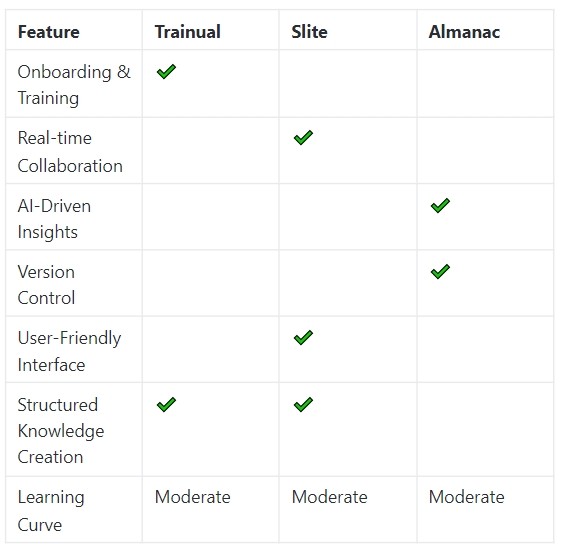Find Your Perfect Match: Choosing the Best Knowledge Management Platform

By Eloiza Mariano Serate
There are many Knowledge Management platforms out there. Some are better than others – so choosing the right platform can be a game-changer for your organization.
Trainual, Slite, and Almanac stand out as formidable contenders, each offering unique features tailored to streamline knowledge sharing and enhance collaboration.
In this blog, we will review the strengths and capabilities of each knowledge base, helping you make an informed decision that aligns with the specific needs of your team.
Trainual: Empowering Onboarding and Training
What is Trainual?
Trainual is a comprehensive knowledge management platform designed to streamline the onboarding and training processes within organizations. This cloud-based software empowers companies to efficiently create, organize, and deliver training materials, making it an invaluable tool for employee education and skill development.
Trainual excels in providing a structured approach to onboarding, allowing businesses to document and systematize their processes, policies, and procedures. The platform supports various multimedia formats, including text, images, and videos, ensuring that training content is engaging and accessible. With its user-friendly interface, Trainual helps organizations centralize their training resources, track employee progress, and foster a culture of continuous learning.
Pros:
• Structured Onboarding: Trainual excels in structured onboarding processes, making it an ideal choice for organizations focused on comprehensive training programs.
• Interactive Content: The platform supports various media types, ensuring engaging and interactive training materials.
Cons:
• Limited Collaboration Features: While robust for training, Trainual might lack some advanced collaboration features compared to other knowledge bases.
Ideal For:
Organizations placing a premium on streamlined onboarding processes and comprehensive training programs.
Slite: A Collaborative Hub for Information Sharing
What is Slite?
Slite is a collaborative knowledge management platform designed to facilitate efficient information sharing and collaboration within teams. Positioned as a versatile solution for note-taking, documentation, and team collaboration, Slite focuses on providing a user-friendly interface that encourages real-time collaboration. The platform allows teams to create, edit, and organize content collaboratively, fostering a dynamic and interactive knowledge-sharing environment. With Slite, users can centralize their notes, documents, and knowledge resources, ensuring that information is readily accessible to team members.
Slite’s approval system offers benefits such as streamlined feedback processes, clear accountability, and efficient decision-making. With designated approval workflows, teams can easily request, track, and obtain approvals for documents, ensuring smoother collaboration and timely progress.
However, the system may face limitations concerning flexibility, particularly in accommodating various approval hierarchies or complex review processes. Additionally, there could be challenges in integrating the approval system seamlessly with existing workflows or external tools. Users may also encounter a learning curve while adapting to the new approval processes within Slite, potentially impacting initial efficiency.
One of Slite’s standout features is its emphasis on real-time collaboration. Team members can work on documents together, make instant updates, and engage in discussions within the platform. This capability makes Slite particularly suitable for teams that prioritize seamless collaboration and need a centralized space for creating and sharing knowledge. Whether it’s meeting notes, project documentation, or collaborative brainstorming sessions, Slite provides a flexible and intuitive platform for teams to collectively build and organize their knowledge base.
Pros:
• Real-time Collaboration: Slite shines in real-time collaboration, offering collaborative document editing and instant updates to keep teams on the same page.
• Intuitive Interface: Its user-friendly interface makes knowledge creation and sharing accessible to all team members.
Cons:
• Learning Curve: Some users may experience a slight learning curve, particularly if they’re new to collaborative knowledge base platforms.
Ideal For:
Teams emphasizing real-time collaboration and those seeking a user-friendly platform for knowledge creation.
Almanac: The Future-Ready Knowledge Base
What is Almanac?
Almanac is an advanced knowledge management platform that leverages artificial intelligence (AI) to enhance collaboration and decision-making within organizations. Positioned as a future-ready solution, Almanac goes beyond traditional knowledge bases by offering AI-driven insights and meticulous version control features. The platform enables teams to create, edit, and organize documents collaboratively while harnessing the power of AI to provide valuable insights, trends, and recommendations based on the content stored within the system.
Almanac is different from other knowledge base software because it gives you status reports for each document. With Almanac, you can easily ask for feedback or approval using structured workflows and share read receipts. This makes collaboration smoother and clearer for everyone working on the project.
Another one of Almanac’s key strengths lies in its commitment to future-proofing knowledge management. The incorporation of AI-driven features not only assists in creating a smarter and more intuitive platform but also positions Almanac as a tool for data-driven decision-making. The platform’s emphasis on version control ensures the accuracy and traceability of evolving documents, making it an ideal choice for organizations that value precision and seek to integrate AI capabilities into their knowledge management practices. With its forward-looking approach, Almanac aims to revolutionize how teams collaborate and leverage knowledge, paving the way for a more intelligent and efficient workplace.
Pros:
• AI-Driven Insights: Almanac leverages AI for insights, making it a forward-looking choice for organizations that value data-driven decision-making.
• Version Control: Robust version control features ensure accuracy and traceability in evolving documents.
Cons:
• Learning Curve: Similar to Slite, Almanac may have a learning curve for users unfamiliar with its advanced features.
Ideal For:
Organizations aiming for future-ready knowledge management with AI-driven insights and meticulous version control.
Comparison Chart
While the features below may be present in all software, this table shows what is considered to have the best execution of the outlined key features below.

Choosing the Right Knowledge Base for Your Team
Selecting the ideal knowledge base hinges on your organization’s unique requirements. Trainual stands out for structured onboarding, Slite excels in real-time collaboration, while Almanac positions itself as a future-ready solution with AI-driven insights.
Consider your team’s specific needs, collaboration preferences, and the learning curve your team is willing to navigate. Each platform has its strengths, ensuring that there’s a perfect fit for every organization seeking to revolutionize its knowledge management practices.
📞 Are you ready to take your business to the next level? Click the link below to book a call with us and discover how our services can help you win your business battles. 🚀
Let’s have a conversation and get the best Virtual Champion for you!
Want to hear the latest news about Virtual Champions PH?
This could be the start of something awesome! Subscribe to our newsletter. Stay updated with exclusive tips, articles, new product tools and notifications, as well as special service offers from VCPH conveniently in your inbox!
